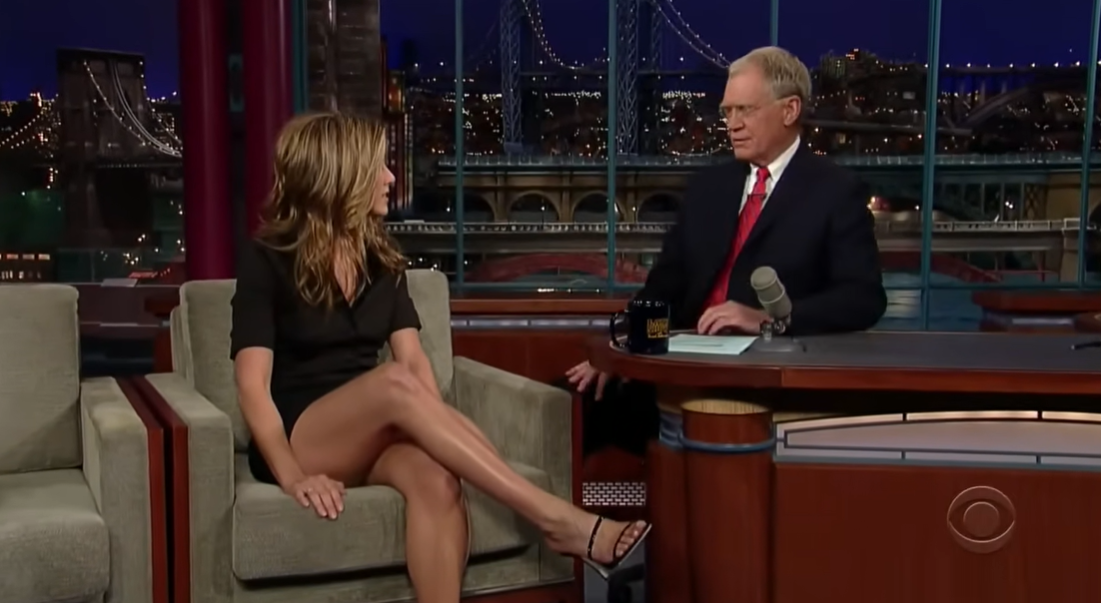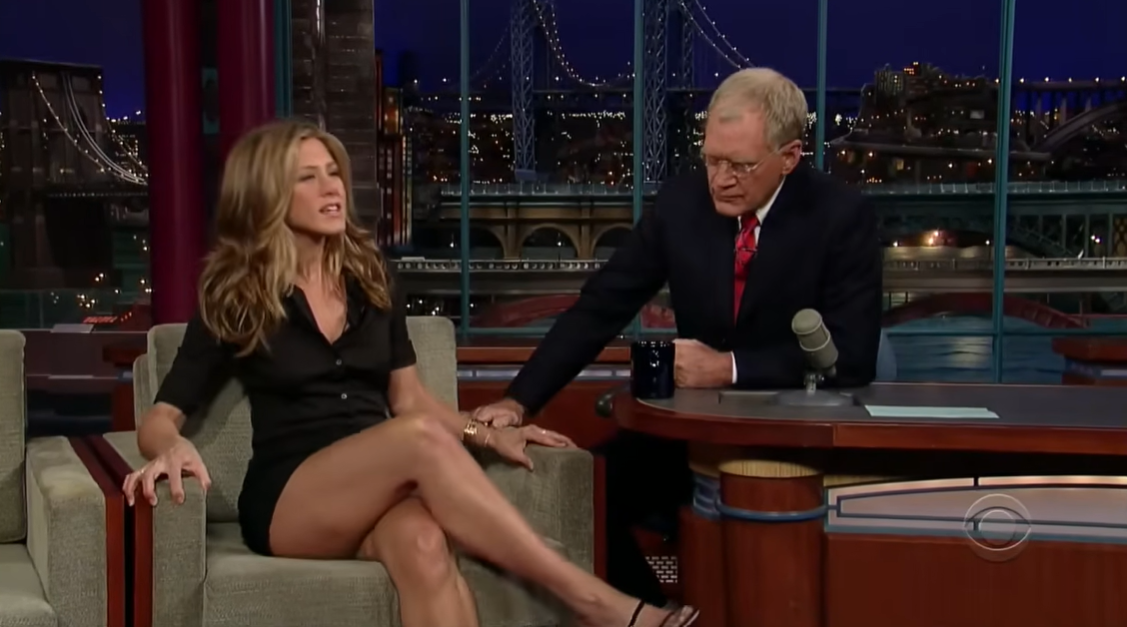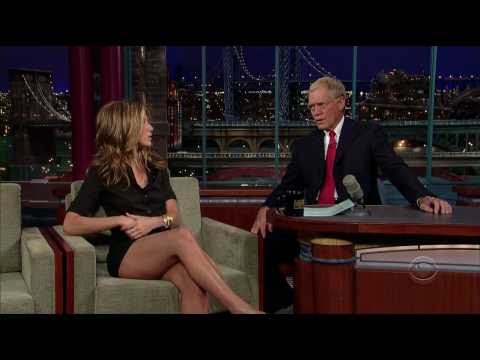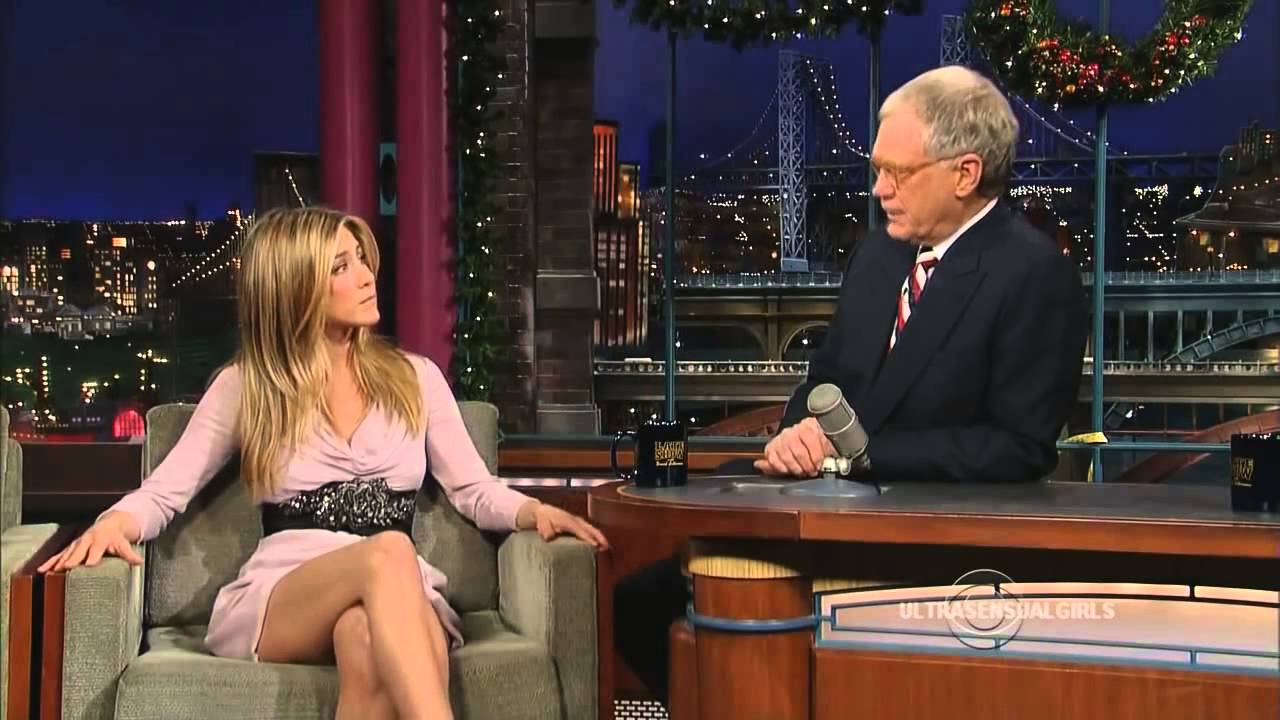David Letterman is known as one of television’s most iconic late-night hosts. His sharp humor, quick wit, and ability to make guests laugh defined an era of talk shows. Yet, not all of his interviews have aged gracefully. One, in particular, involving Jennifer Aniston, has resurfaced years later, sparking renewed discussions about how awkward and uncomfortable it truly was.

In recent years, fans have reexamined moments from Letterman’s career, questioning the kind of humor that was once seen as playful but now feels out of place. The 2006 interview with Jennifer Aniston stands as one of those moments; what began as a simple promotional chat for her movie turned into something far more uneasy to watch.
A resurfaced photo of David Letterman and Jennifer Aniston brought back attention to a moment many had tried to forget.
The actress appeared on The Late Show in 2006 to promote her romantic comedy The Break-Up, where she starred alongside Vince Vaughn.
At first, it seemed like any other celebrity interview. Aniston walked in wearing a chic black outfit: a button-down blouse and matching shorts. But almost immediately, Letterman began to focus on her appearance rather than her movie.
“That’s a tremendous outfit,” he said. Then, with a grin, he added, “And the reason that’s a tremendous outfit is because you have tremendous legs. Fantastic legs.”
The camera operator followed his lead, zooming in to highlight Aniston’s legs while the audience laughed uncomfortably. Trying to brush it off, she joked that she wore shorts simply because it was hot. But the tension in her smile revealed she wasn’t at ease.
Letterman didn’t stop there. A few moments later, he brought up her legs again, saying, “Your legs, you’ve got something there.” Viewers at home cringed, and the clip has only become more uncomfortable to watch over time.
During this David Letterman interview, the atmosphere changed from lighthearted to uneasy. His repeated focus on Aniston’s looks instead of her film came across as intrusive, even though it might have been meant as harmless banter.
Then, he shifted the conversation to her rumored relationship with Vince Vaughn, pressing her for answers about whether it was Vaughn’s idea for her to appear naked in the movie. Caught off guard, Aniston hesitated before replying that Letterman should have asked Vaughn that question instead. Her calm response helped her navigate the awkward moment, but her discomfort was visible.
What audiences once laughed at now feels wrong. The clip has been shared widely across social media, where users discuss how normalized such behavior once was in entertainment.
Rewatching old David Letterman moments has become a reminder of how much television has changed. Viewers who revisit the Jennifer Aniston interview often express secondhand embarrassment. Many describe her smile as polite but tense, and her laughter as forced.
Fans online often note how the exchange feels unbalanced. Letterman kept steering the talk toward personal topics and appearance, while Aniston tried to focus on her film. Despite the pressure, she handled the situation gracefully, something that only increased admiration for her professionalism.
Unfortunately, this wasn’t the first time David Letterman made Jennifer Aniston uncomfortable on air. An earlier 1998 appearance has also gained attention for all the wrong reasons. During that segment, Letterman suddenly leaned in, grabbed a strand of her hair, and put it in his mouth.
Aniston froze in surprise, clearly unsure how to react. Trying to defuse the situation, Letterman handed her a tissue so she could wipe her hair. The audience laughed, but her expression said everything.
The moment has since become one of the most talked-about and criticized parts of his career. Many have labeled it as inappropriate and unnecessary, while others point to it as an example of the casual disrespect women often faced during interviews at the time.
Through both of these David Letterman interviews, Jennifer Aniston maintained an incredible level of composure. Instead of reacting angrily or walking off stage, she stayed calm, answered with humor, and kept her dignity intact. Her ability to remain collected, even when visibly uncomfortable, reminded audiences why she has always been admired for her class and poise.
Two years after the 2006 incident, Aniston returned once again to The Late Show, proving she could rise above even the most uncomfortable encounters. This time, she wore a pink dress and looked radiant, handling the interview with confidence.
While promoting her film Marley & Me, Aniston made another memorable appearance with David Letterman. However, this time, the tone was lighter. She brought the host a special Christmas gift: a Brooks Brothers tie that held personal meaning.
Smiling, she told him, “It’s an early Christmas present.” Letterman took off his own tie and let Aniston help him put on the new one. The gesture was playful, especially since it was the same tie she wore on the cover of GQ magazine, where she appeared wearing only that accessory.
“This is a highlight of my career,” she said with a grin. Letterman laughed and replied, “Funny, the tie said the same thing during the photoshoot.” The two shared a brief, friendly moment, a rare contrast to their past tension.
Even then, the interaction carried traces of flirtation, but Aniston’s confidence seemed to give her full control over the situation. She smiled, laughed, and handled the moment gracefully, reminding everyone that she could command attention on her own terms.
Today, clips from David Letterman’s interviews with Jennifer Aniston often go viral. People rewatch them not only for nostalgia but also to reflect on how attitudes toward female guests have changed.
Social media users frequently point out how the same jokes that once drew laughter now feel inappropriate. What was considered humor years ago is now recognized as boundary-crossing behavior. These conversations have sparked broader discussions about the power dynamics in talk shows and how hosts are now more mindful of respecting their guests.
Watching David Letterman today offers a glimpse into how entertainment used to work. Hosts were given almost unlimited freedom to tease or make personal remarks. Female celebrities, in particular, were often put on the spot with questions or comments about their looks or relationships rather than their achievements.
The Jennifer Aniston interviews highlight that contrast vividly. They remind viewers that what once seemed harmless banter can actually make someone deeply uncomfortable, even if they hide it behind a smile.
Despite the awkwardness of her experiences with David Letterman, Jennifer Aniston never publicly criticized him. Her silence, in many ways, spoke louder than words. It showed that she chose not to dwell on the past or let uncomfortable moments define her.
Her calm reaction, professionalism, and grace turned what could have been embarrassing experiences into moments of strength. For many fans, that poise is what makes Aniston stand out, not just as an actress but as a person who handles challenges with quiet confidence.
Time has a way of revealing what we once overlooked. Watching the David Letterman interviews today, people can clearly see how much both television culture and society have evolved. What might have once drawn laughter now sparks conversations about respect, equality, and awareness.

Letterman himself has acknowledged in later years that he has changed, becoming more reflective about how he handled certain moments during his career. Whether he regrets specific interactions or not, these clips remain a reminder of how far the entertainment world has come.
The David Letterman interviews with Jennifer Aniston continue to circulate online because they represent more than just celebrity gossip. They mark a shift in awareness; a realization that not all humor ages well, and that empathy matters as much as entertainment.
Even in uncomfortable situations, Aniston’s grace shone through. She turned moments that could have embarrassed her into examples of composure. The contrast between her calm demeanor and the awkward tone of the interviews makes viewers appreciate her even more.
Looking back, David Letterman’s interviews with Jennifer Aniston reveal both the brilliance and flaws of a particular era in television. They reveal how humor and boundaries have evolved, and how celebrities like Aniston managed to stay graceful through moments that would challenge anyone’s patience.
What remains clear is that respect and empathy have become central to modern entertainment. Watching these old clips now reminds us of how far the media has come and how some of the most uncomfortable moments in TV history have become important lessons in dignity and awareness.


